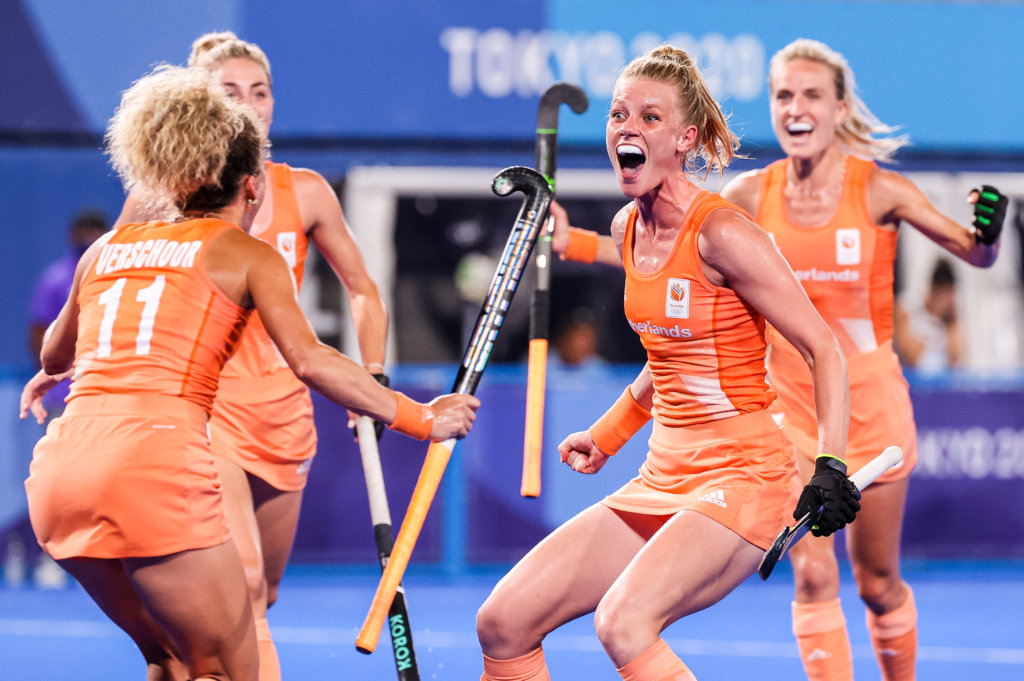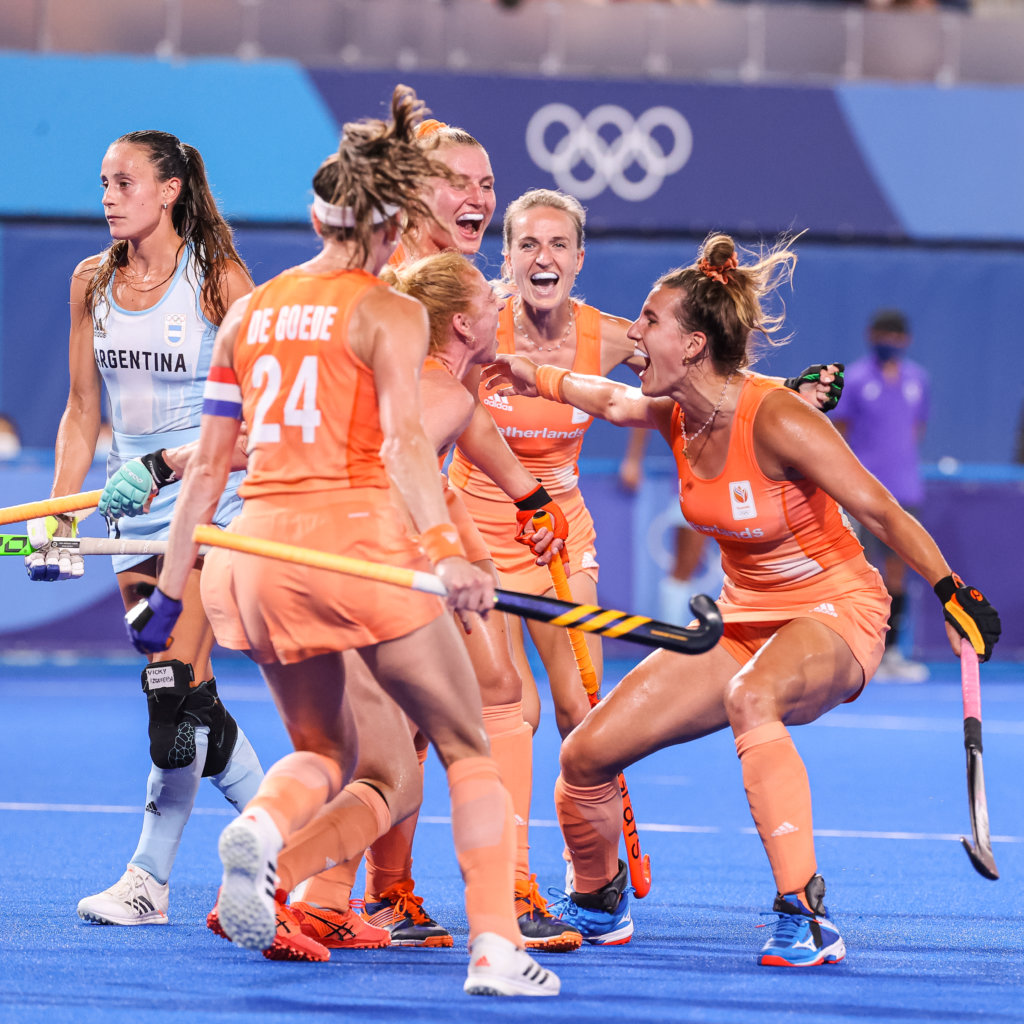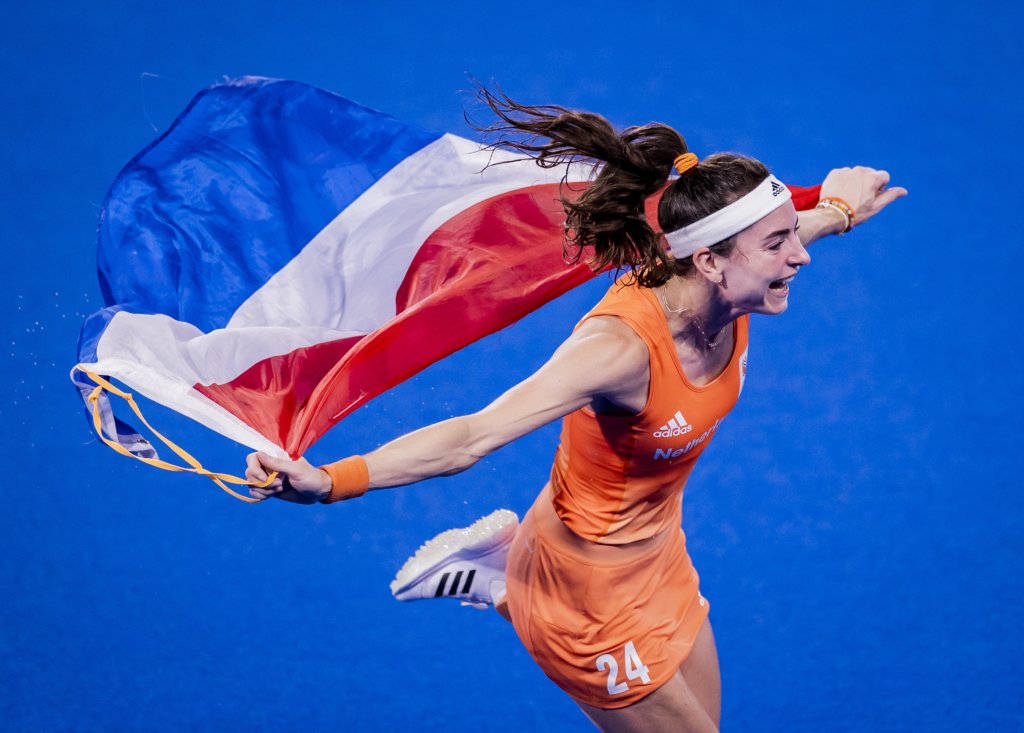
The Netherlands has crowned its reign of the past five years with an Olympic gold medal. In Tokyo, the Orange Women won the final against Argentina 3-1 on Friday. A key role was played by the retiring Caia van Maasakker, who converted two penalty corners. For the Netherlands, it is the fourth Olympic title in women’s hockey and the first since that of 2012 in London.
Ceremony
Photo: Netherlands gold medal
COPYRIGHT WORLDSPORTPICS FRANK UIJLENBROEK
The hands of Van Maasakker, who played her last match against Argentina, went up five seconds before the buzzer sounded. She then found the arms of Eva de Goede and Lauren Stam, after which the substitutes stormed into the field and the Netherlands cheered in a circle to celebrate the achievement of Olympic gold.
With two striking drag pushes, Van Maasakker led the Orange Ladies in the second quarter from a 1-0 to a 3-0 lead. It was a dream match for the retiring Van Maasakker, whose penalty corner has been criticized not only during these Olympic Games, but in recent years.

Since Rio de Janeiro, the Netherlands has only lost three of the 104 international matches
After the dramatically lost Olympic final against Great Britain in Rio de Janeiro in 2016, the Dutch national team said goodbye to no fewer than eight internationals. Former World Players of the Year Maartje Paumen (2011, 2012), Naomi van As (2009, 2016) and Ellen Hoog (2014), among others, end their impressive international career, in which they won the world title (2014) and the Olympic title (2008) in the Netherlands. , 2012) delivered.
National coach Alyson Annan stayed on after the silver of Rio de Janeiro. She gave the Dutch national team a rejuvenation cure and built a team that was called ‘the new Orange’ in the first few months because of the many newcomers. Josine Koning, Anne Veenendaal, Frédérique Matla, Lauren Stam and Pien Sanders, among others, were transferred from the national youth teams. Malou Pheninckx and Ireen van den Assem, who was injured before Tokyo, started a second hockey life as an international. It was unclear exactly how strong the renewed selection was compared to before and compared to other countries.
The renovation turned out to be the starting signal for a golden period. Since the lost 2016 Olympic final in Rio de Janeiro, the Orange Women have suffered only three defeats in 104 international matches in five years (92 wins, 8 draws). Only Belgium (0-1), Australia (1-0) and Argentina (2-0) lost.

All tournaments in which the Dutch participated in the past five years were won. Often with force majeure too. Successively, the Netherlands won the European Championship (2017), the Hockey World League (2017), the World Cup (2018), the Champions Trophy (2018), the FIH Pro League (2019), the European Championship (2019), the FIH Pro League (2021) and the European Championship (2021).
Key to the success was, among other things, the confidence that Annan gave to the regular core players. For five years, the selection of the Netherlands was largely a closed bastion. Of the sixteen internationals in Tokyo, twelve were in Brussels in 2017 during the Hockey World League Semi-Final, the first tournament after the Olympic Games in Rio de Janeiro. Lidewij Welten was absent during that HWL due to an injury and Eva de Goede was enjoying a sabbatical at the time. Only Sanne Koolen and Felice Albers of the Tokyo-goers joined the Orange team later. As a result, Annan dragged automatisms into the team for five years, which impressed with tiki-taka hockey both at the 2018 World Championship and at these Olympic Games in Tokyo.

The Netherlands also rose above everything and everyone at these Olympic Games. All matches were won in the group stage. New Zealand didn’t stand a chance in the quarterfinals. Also impressive was the way in which outgoing champion Great Britain was sidelined in the semi-finals. The gold medal was up for grabs.
Argentina, the current number two in the world, was also unable to withstand the Dutch college hockey in the final. After five minutes it was Margot van Geffen who took the first penalty corner. Caia van Maasakker’s drag push, who played her last game, exploded on the crossbar.
After a strong opening phase by the Orange squad, Argentina gained more possession halfway through the first quarter. It provided the first field opportunity of the game for Micaela Retegui, the daughter of national coach Carlos Retegui. She hit a bouncing ball towards the goal, but she didn’t hit it well and shot wide. It was immediately clear that Argentina was a serious opponent. It was really a game in which hard duels were fought.

The Netherlands started the second quarter strongly. The dribble over the back line of midfielder Laura Nunnink was wonderful. She slalomed in front of four Argentina players, after which she pushed on goal with her backhand, but the ball went wide. Moments later, Maria Verschoor shot out of the turn against the side plank. Orange was chasing a goal.
That fell after 23 minutes of hockey, when Frédérique Matla took a penalty corner from a penalty corner. This time a variant was chosen. Matla replaced the incoming Margot van Geffen, who slipped in the 1-0. Rarely in the past five years have the Orange Ladies cheered as loudly as they do now. Ancient cries echoed through Tokyo’s Oi Hockey Stadium.
After that, the score went very fast. Van Maasakker first dragged the 2-0 onto the board from a penalty corner, through the legs of line stopper Sofia Toccalin. Three minutes later she also pushed in the 3-0 from the head circle, in the bottom left corner. Delirious with joy, her teammates fell into her arms.
Before the break, Las Leonas did something back, when the Argentinian drag star Agustina Gorzelany pushed in the 3-1 through the legs of goalkeeper Josine Koning. The Argentines were then looking for the 3-2 in the third quarter, but in general the Netherlands continued to dominate. Verschoor had the 4-1 on her stick, but ran into goalkeeper Belén Succi.

Tension mounted at the start of the final quarter, when Argentina scored two penalty corners in a row. Twice it was goalscorer Gorzelany who pushed. But both times her grenade bounced off a corner on the running Lidewij Welten, who prevented the 3-2 at the risk of his own life.
Three minutes before the end, the Argentines fervently hoped for another penalty corner, but the video referee did not agree with them. The time then ticked away and the Orange defense gave nothing more. When the buzzer sounded after seventy minutes of hockey, the Olympic gold had been won: the award for being the best team in the world for five years.
Netherlands – Argentina 3-1 (3-1)
’23 Margot van Geffen 1-0 (sc)
’25 Caia van Maasakker 2-0 (sc)
’28 Caia van Maasakker 3-0 (sc)
’30 Agustina Gorzelany 3- 1 (sc)
